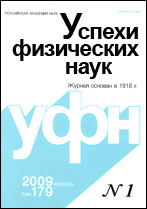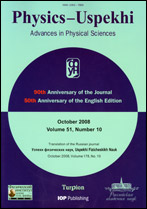|
This article is cited in 63 scientific papers (total in 63 papers)
REVIEWS OF TOPICAL PROBLEMS
Concept of consciousness in the context of quantum mechanics
M. B. Menskii
P. N. Lebedev Physical Institute, Russian Academy of Sciences
Abstract:
Conceptual problems of the quantum theory of measurement are considered, which are embodied in well-known paradoxes and in Bell's inequalities. Arguments are advanced in favor of the viewpoint that these problems may hardly be solved without direct inclusion of the observer's consciousness in the theoretical description of a quantum measurement. Discussed in this connection is the so-called many-worlds interpretation of quantum mechanics proposed by Everett, as is the extension of Everett's concept, which consists in the assumption that separating the quantum state components corresponding to alternative measurements is not only associated with the observer's consciousness but is completely identified with it. This approach is shown to open up qualitatively new avenues for the unification of physics and psychology and, more broadly, of the sciences and the humanities. This may lead to an extension of the theory of consciousness and shed light on significant and previously misunderstood phenomena in the sphere of consciousness.
Received: November 19, 2004
Citation:
M. B. Menskii, “Concept of consciousness in the context of quantum mechanics”, UFN, 175:4 (2005), 413–435; Phys. Usp., 48:4 (2005), 389–409
Linking options:
https://www.mathnet.ru/eng/ufn170 https://www.mathnet.ru/eng/ufn/v175/i4/p413
|


|





 Contact us:
Contact us: Terms of Use
Terms of Use
 Registration to the website
Registration to the website Logotypes
Logotypes








 Citation in format
Citation in format 
